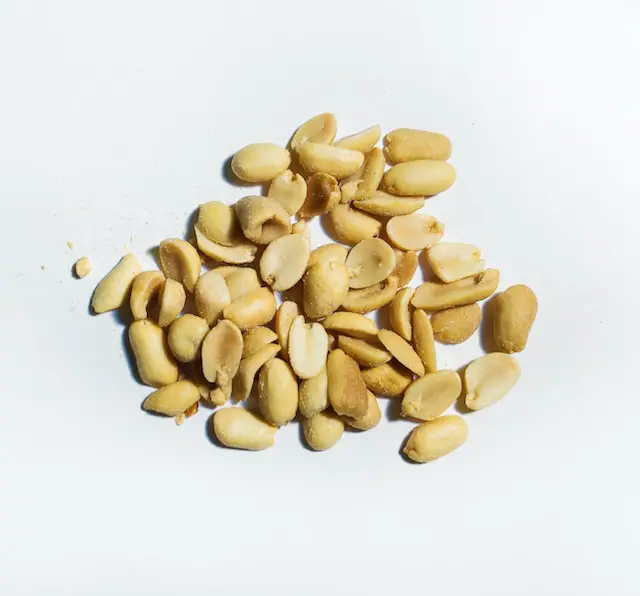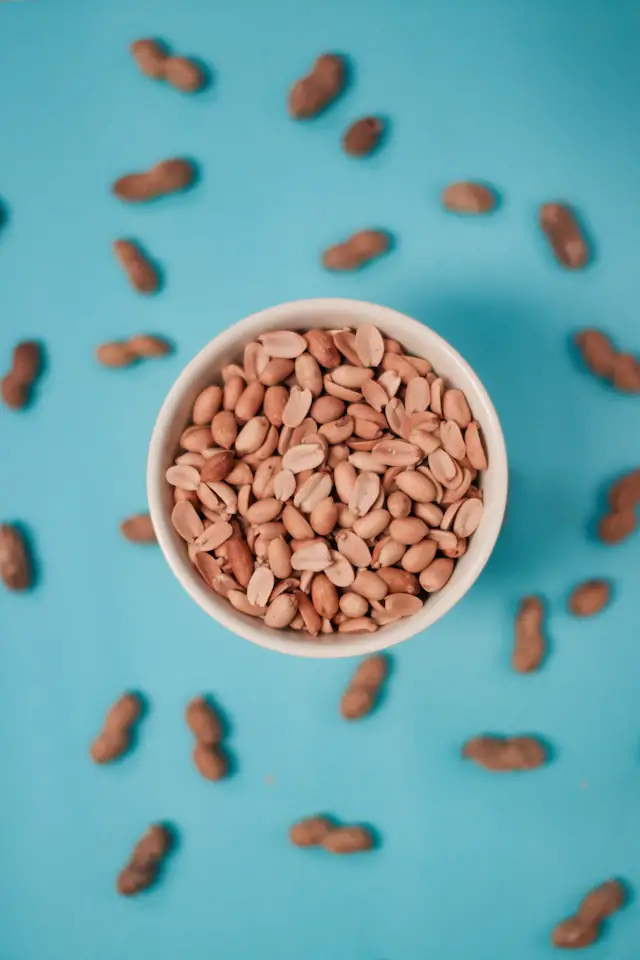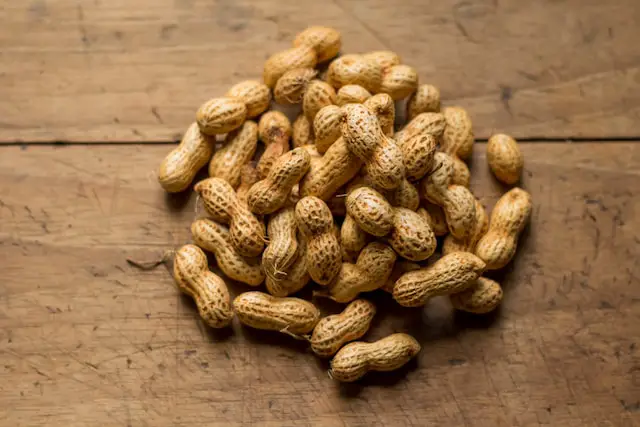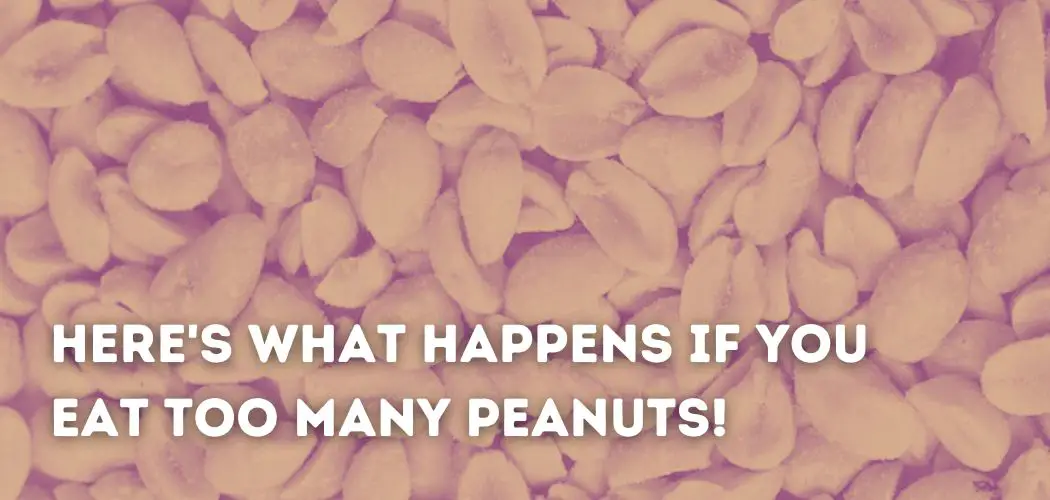Peanuts are a delicious and nutritious snack that many people enjoy. They are packed with protein, healthy fats, fiber, and essential nutrients like vitamins and minerals.
However, like any other food, consuming too many peanuts can have negative consequences on your health.
If you eat too many peanuts, you may experience some side effects, including:
Contents
Weight Gain
Peanuts are high in calories, so consuming too many can lead to weight gain. One ounce of peanuts (about 28 grams) contains approximately 161 calories. If you consume a lot of peanuts regularly, you may find it difficult to maintain a healthy weight.
Digestive Problems
Peanuts are high in fiber, which can be beneficial for digestion. However, consuming too many peanuts can lead to digestive problems like bloating, gas, and constipation. This is because your body may struggle to break down the large amount of fiber in the peanuts.
Allergic Reactions
Some people are allergic to peanuts, and consuming too many can trigger an allergic reaction. Symptoms of a peanut allergy can range from mild, such as itching or hives, to severe, such as anaphylaxis.
If you experience any symptoms of an allergic reaction after consuming peanuts, seek medical attention immediately.
Mineral Deficiencies
Although peanuts are a good source of nutrients like magnesium and zinc, consuming too many can actually lead to mineral deficiencies. This is because peanuts contain phytic acid, which can bind to minerals and prevent their absorption by the body.

To avoid the negative consequences of eating too many peanuts, it is recommended that you consume them in moderation. A serving size of peanuts is typically one ounce, or about a handful.
Additionally, try to opt for unsalted peanuts to avoid consuming too much sodium, and avoid peanuts with added sugars or flavorings.
Danger Of Mold Contamination
Peanuts are a crop that can be susceptible to mold contamination, particularly when they are grown or stored in warm, humid conditions.
Mold contamination can occur both before and after the peanuts are harvested, and it can lead to the production of mycotoxins, which are toxic substances produced by certain types of fungi.
If peanuts are contaminated with mold and mycotoxins, they can pose a health risk to people who consume them. Mycotoxins can cause a range of health problems, including liver damage, cancer, and neurological issues.

However, it is important to note that mold contamination is not solely a risk for people who eat a lot of peanuts. Anyone who consumes peanuts or peanut products can be at risk of mold contamination, regardless of how much they consume.
To minimize the risk of mold contamination in peanuts, it is important to store them properly in a cool, dry place.
Peanuts that are sold in sealed packages or containers are typically less susceptible to mold growth, but it is still important to check the expiration date and look for signs of mold before consuming them.
Health Advantages Of Consuming Peanuts In Moderation
Eating peanuts in moderation can provide a number of health benefits. Here are some of the main health benefits associated with consuming peanuts:
- Heart health: Peanuts are rich in monounsaturated and polyunsaturated fats, which can help lower bad cholesterol levels (LDL) and reduce the risk of heart disease. They are also a good source of magnesium, which is important for maintaining healthy blood pressure.
- Diabetes management: Peanuts have a low glycemic index, meaning they cause a slow and steady rise in blood sugar levels. This makes them a good choice for people with diabetes or those at risk of developing the condition.
- Brain health: Peanuts are a good source of vitamin E, which has been linked to better brain function and a reduced risk of cognitive decline as we age.
- Bone health: Peanuts are a good source of several minerals that are important for bone health, including magnesium, phosphorus, and potassium.
- Cancer prevention: Some studies have suggested that consuming peanuts may help reduce the risk of certain types of cancer, including colon, breast, and prostate cancer.
Overall, consuming peanuts in moderation can provide a range of health benefits. However, it is important to be mindful of portion sizes and to choose healthy varieties, such as unsalted, natural peanuts, in order to maximize these benefits.
Ideal Consumption Of Peanuts
The ideal consumption of peanuts can vary depending on a person’s age, sex, weight, and activity level, but the general recommendation is to consume no more than one ounce (or about 28 grams) of peanuts per day.

It is important to note that peanuts are calorie-dense, so consuming too many can lead to weight gain. One ounce of peanuts contains approximately 161 calories, so it is important to factor this into your daily calorie intake if you are trying to maintain a healthy weight.
Salted peanuts should also be consumed in moderation, as they can be high in sodium, which can increase the risk of high blood pressure and other health problems.
Peanuts can be consumed in a variety of ways, such as raw, roasted, or ground into peanut butter. They can also be added to dishes like stir-fries, salads, and oatmeal for added flavor and nutrition.
The ideal consumption of peanuts is about one ounce per day, but this can vary depending on a person’s individual needs and preferences. To maximize the health benefits of peanuts, choose healthy varieties and incorporate them into a balanced and varied diet.
Conclusion
Peanuts are a nutritious and delicious food that can provide a number of health benefits when consumed in moderation. They are rich in protein, fiber, healthy fats, vitamins, and minerals, and they can be consumed in a variety of ways.
However, it is important to be mindful of the potential risks of consuming too many peanuts, such as weight gain, digestive problems, allergic reactions, dental problems, and mineral deficiencies.
Overall, incorporating peanuts into a balanced and varied diet can be a great way to boost nutrition and add flavor to meals and snacks. As with any food, moderation and healthy choices are key to enjoying the benefits of peanuts while minimizing the potential risks.
